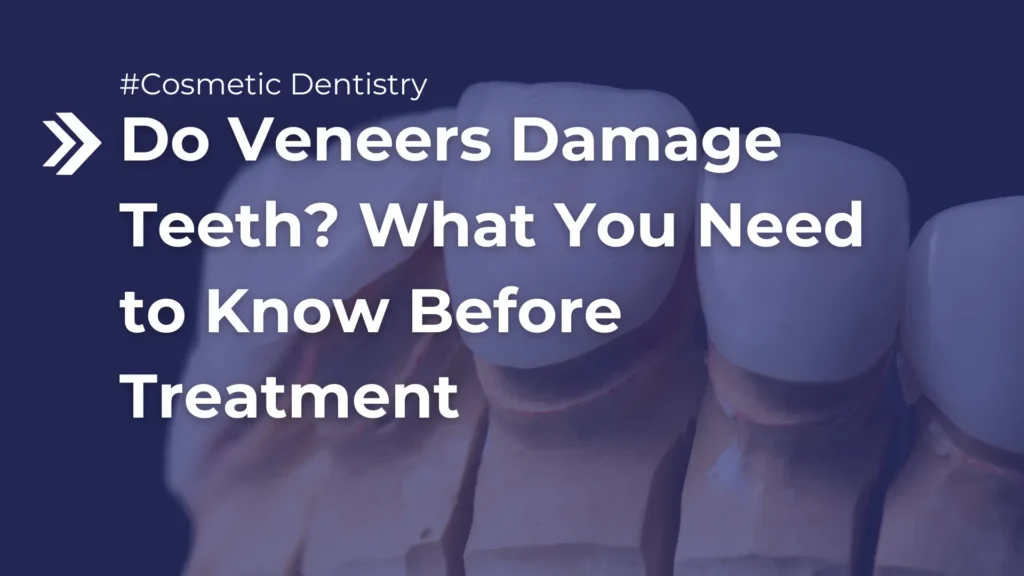
Veneers can take a smile you feel ashamed of and turn it into something that makes you beam with pride. Whether you have chips, cracks, small gaps, minor misalignment, or discoloration in your teeth, this procedure can make a huge difference in your life. However, many hesitant New Yorkers ask the same question when considering this option: “Do veneers ruin your teeth?”
At Babylon Dental Care, we believe in sharing our knowledge with patients so they can make informed decisions about their oral health. This quick guide does that by busting myths about veneers and tooth damage.
What Are Veneers and How Do They Work?
Veneers are thin, custom-made shells that bond to the front surface of teeth to improve their appearance. The most common material used to craft them is durable, stain-resistant porcelain, but an affordable yet attractive composite resin material can also be used. This procedure corrects cosmetic flaws while preserving as much of your natural tooth as possible.
What Are Dental Veneers Used For?
Veneers can address a wide range of aesthetic issues with teeth, including:
- Covering deep stains that whitening can’t remove
- Closing small gaps between teeth
- Repairing chips or minor cracks
- Reshaping uneven or worn teeth
- Addressing minor misalignment issues
The veneer procedure can address minor issues that impact your smile’s appearance and your self-confidence. More significant tooth damage, gaps, and misalignment typically require more complicated procedures to address.
How Veneers Work on Teeth
When you receive veneers, you can expect the following process:
- Consultation: Your dentist evaluates your oral health and your bite to determine whether veneers are a good option for you. They’ll then take digital imaging or impressions to design the veneers to match your appearance and natural tooth color.
- Tooth Preparation: To make room for the veneer, your dentist removes a fragile layer of enamel, typically around a half a millimeter. The preparation allows the veneer to fit seamlessly without looking bulky.
- Temporary Veneers: You receive temporary veneers while the dental lab crafts the permanent ones. This step helps protect your teeth and gives you a preview of your brand-new smile while you wait.
- Final Bonding: Once ready, your dentist will check the fit and color of your new veneers before bonding them in place using a strong dental adhesive. You’ll leave your appointment with a radiant, natural-looking new smile that can last 10 to 20 years with proper care.
Do Veneers Ruin or Damage Your Natural Teeth?
Many myths and exaggerations surround the supposed risks of getting veneers, most of which center on the tooth preparation process. Fortunately, veneers don’t damage healthy teeth when properly applied. Here’s what actually happens when you undergo this procedure:
- Your dentist removes a minimal amount of enamel to make space for the veneer
- The underlying tooth structure remains intact and protected
- The bonding process seals the enamel, preventing bacteria from entering.
Rather than “ruining” your natural teeth, veneers create a protective barrier against staining, chips, cracks, and everyday wear. However, veneers can cause problems if:
- Too much enamel is removed during preparation
- Poor bonding allows bacteria to seep underneath
- The veneers are poorly placed
These risks underscore the importance of selecting a skilled cosmetic dentist who utilizes high-quality materials. If a reputable individual performs the procedure, then you typically don’t have to worry about potential complications.
Long-Term Effects of Veneers on Enamel and Oral Health

When properly placed and cared for, veneers can beautify and protect your smile for many years to come. However, if the procedure is performed incorrectly and you don’t know how to protect teeth with veneers, you run the risk of:
- Tooth Decay: Poorly bonded veneers can allow bacteria to seep underneath and increase the risk of tooth decay. Be sure to brush twice and floss once daily to protect your teeth against this issue.
- Increased Tooth Sensitivity: An inexperienced dentist may remove too much enamel or improperly bond the veneer, resulting in increased sensitivity to hot and cold temperatures.
- Mismatched Tooth Color: Veneers are stain-resistant, but natural teeth are not. If you fail to properly care for them, your natural teeth may become stained or discolored while your veneers remain white.
- Cracks or Chips: Veneers are durable and strong, but they are not invincible. To protect your new smile, avoid chewing or biting on hard objects.
Contact Babylon Dental Care Today
If you’d like to learn more about the pros and cons of veneers for dental health, Babylon Dental Care can provide valuable insights. Our team can assess your oral health to determine whether veneers are a suitable solution for you. Contact us online or call (631) 983-6665 to schedule an appointment.
